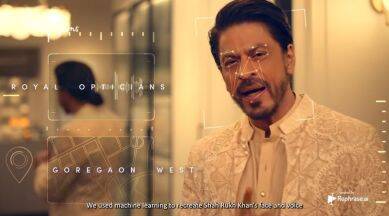“It was a challenging task for us as there were five avatars to be created and a lot of work went into finalising the voice models. It was five huge projects clubbed into one.” Ashray Malhotra, co-founder of Rephrase.ai, is still on a high from the success of his latest creation. His company is behind the second edition of the innovative ‘Not Just a Cadbury Ad’ which uses Shah Rukh Khan’s digital avatar to extend support to thousands of small businesses and store vendors who suffered during the coronavirus pandemic.
Anyone can now visit notjustacadburyad.com, enter the pin code, select the store’s name — limited to fashion, footwear, electronics and grocery — and get a personalised advertisement where the superstar will be taking the names of these stores.
The magic was all thanks to the artificial intelligence (AI) grid created by Rephrase.ai. The company, which has been working on generative AI technology for three years, was approached by Mondelez India and Ogilvy India for the second edition of ‘Not Just a Cadbury Ad’ in September 2021.
“We created a digital avatar of Shahrukh Khan by creating five clones for each category. What makes it even more interesting is the fact that it is happening on a pin code level, thus enabling the users/clients to use Rephrase’s voice model and AI tech to create professional and quality hyper-personalized ads,” Malhotra explains to indianexpress.com.
Shahrukh’s clones were created using machine learning tech, mapping between how the character moves and speaks. The previous edition of ‘Not Just a Cadbury Ad’ allowed people to gift a personalised message from Hritik Roshan but this year’s edition is more business-oriented, Malhotra adds.
The ad has been created keeping in mind that a “personalised ad by a superstar can help motivate” small vendors and business owners who have suffered because of the coronavirus pandemic. Malhotra is hopeful about the future of generative AI tech and says “synthetic media is most likely to become a part of people’s lives”.
Google and Facebook do not allow synthetic media-generated content to be shared via their platforms but the ad sought special permissions from the tech giants to provide space to their content. “We had a chat with Facebook and Google regarding their already existing policies and this ad is an exception. These tech giants have a huge social responsibility and it is crucial to build the required trust among the stakeholders to move forward. Once the initial boundary of inhibitions is crossed, it will become a de-facto thing,” Malhotra adds.
Speaking about the future of generative AI tech, Malhotra says that the company will be creating digital avatars of CEOs, CFOs who will be interacting with their employees directly. “Huge companies often find it difficult to connect with every employee, but it can be made possible through tech. FMCG companies can send direct messages or wishes to their customers,” he explains, adding: “That’s how tech maximises human potential.”
The world moved to a virtual way of working amid the coronavirus outbreak and it has created a demand for hyper-personalised communication. “We have seen an increase in such products from companies as it is very difficult to bring empathy in remote workplaces. As we normalise working virtually, companies will have to adopt technologies to reach out to their employees,” he adds.
But generative AI tech also has its challenges. “When people see an image which does not appear to be right, they can make out that it is morphed. But, the same kind of awareness is not there concerning video content yet. There is a need to educate people on the aspects of synthetic media,” Malhotra accepts.
Source: indianexpress.com









